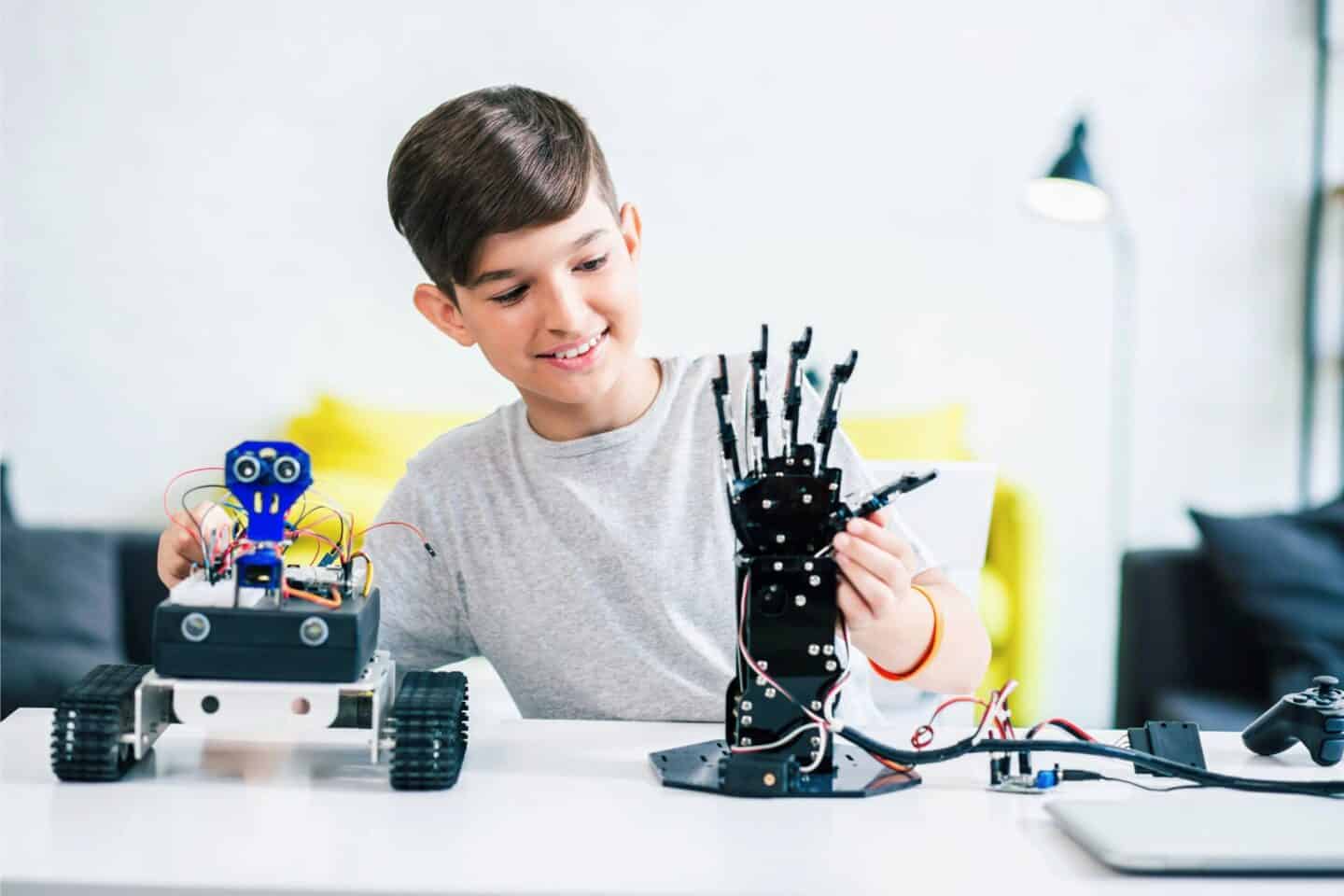Homeschooling A Gifted Child | Tips and Myths for Success
Homeschooling can be overwhelming for any parent, but when your child is gifted, it often adds an extra layer of complexity.
On one hand, it’s exciting to see them dive into new subjects with passion, but on the other, you might worry about how to keep them challenged and engaged.
Gifted children often don’t fit into the traditional school system, which is usually geared toward the average student.
Instead, they thrive in environments where they can move at their own pace, explore their interests, and develop their critical thinking.
If you’ve ever wondered how to create the best learning environment for your gifted child, you’re not alone.
This post will cover what it really means to homeschool a gifted learner, the challenges that come with it, and how to make the most of this incredible opportunity.

**This post may contain affiliate links. As an Amazon Associate and a participant in other affiliate programs, I earn a commission on qualifying purchases.**
What Defines a Gifted Child?
A gifted child typically shows exceptional ability in specific areas far beyond what’s expected for their age. However, being gifted doesn’t mean excelling in every subject.
It’s more about having strong abilities in areas like math, creativity, or problem-solving.
What sets these children apart is their deep curiosity, quick learning, and extensive knowledge in topics that interest them.
One challenge with gifted children is that their intellectual development often outpaces their emotional or social growth, creating an imbalance. For instance, a child may excel in reading but struggle with emotional regulation or relationships with peers.
Some are also “twice-exceptional,” meaning they are gifted but also face learning challenges like ADHD or dyslexia. For these children, public schools often miss the mark, making homeschooling or specialized education plans more suitable.
Why Homeschooling Works for Gifted Children
Homeschooling provides the flexibility to tailor education to your child’s individual needs. In public schools, the curriculum often caters to average students, leaving gifted learners feeling unchallenged.
At home, you can adjust the pace and depth of learning to suit your child’s abilities, allowing them to move quickly through familiar material and spend more time on subjects they find difficult or interesting.
Another advantage of homeschooling is the freedom to explore your child’s passions. Whether it’s science, languages, or technology, homeschooling gives you the flexibility to dive deep into these areas, which is often impossible in traditional settings.
You can organize field trips, connect with experts, or design hands-on projects that align with their interests.
Homeschooling also allows for movement and creativity, which is especially important for gifted kids who might struggle with sitting still in a traditional classroom. This approach gives them the space to learn in a way that suits their unique style.

Common Challenges in Homeschooling a Gifted Child
Homeschooling gifted children has its rewards, but it’s not without challenges. One of the biggest issues parents face is balancing their child’s need for advanced learning with the emotional intensity that often comes with giftedness.
These children can be highly sensitive, perfectionistic, and easily frustrated when things don’t come naturally, making the emotional toll on both child and parent high.
Another challenge is keeping up with their pace. Gifted learners often move through subjects quickly, leaving parents constantly searching for new material to keep them engaged.
Socialization can also be tricky since gifted children may have a hard time connecting with peers their age due to their advanced interests. It’s important to provide opportunities for them to build social skills through co-ops, extracurricular activities, or online communities.
And let’s not forget parent burnout. Homeschooling a gifted child can be exhausting, especially when you’re juggling other responsibilities. It’s important to make time for self-care and seek out support from other homeschooling families who understand the unique challenges you face.

Practical Strategies for Homeschooling a Gifted Child
When homeschooling a gifted child, a bit of structure can make a big difference, though flexibility remains key. Here are a few strategies to help:
Choose a Flexible Curriculum:
Gifted children need a homeschool curriculum that adapts to their pace and interests. Unlike typical students who follow a set curriculum, talented students often benefit from programs that allow them to advance quickly in certain areas while taking time to explore others more deeply.
This flexibility is one of the best ways to nurture both their intellectual growth and emotional needs.
You can also incorporate alternative learning strategies, such as project-based learning or connecting with a local university for advanced courses, particularly as they approach high school.
Foster Critical Thinking:
Gifted learners thrive on challenges that push them to think critically and solve complex problems.
Whether it’s through hands-on science experiments, literature analysis, or tackling advanced math problems, fostering a critical thinking mindset is essential for talent development.
These activities not only engage their curiosity but also prepare them for future academic challenges, whether they’re preparing for high school or beyond.
Support Independence:
Encouraging your child to take ownership of their learning is key to building lifelong learning skills. Allow them to set their own goals, pursue independent projects, and explore topics that interest them.
Supporting independence helps develop a sense of responsibility, and it’s often the best way to keep your gifted child motivated, especially when they move beyond the typical test results used to gauge progress in traditional schools.
Incorporate Movement and Creativity:
Not all learning happens at a desk, and many gifted kids benefit from integrating movement or creativity into their day. Whether it’s building projects, outdoor learning, or creative arts, offering alternative outlets keeps things fresh and caters to different learning styles.
These strategies also address their emotional needs, ensuring they stay engaged and avoid burnout from a more rigid, typical classroom environment.
Prioritize Social Opportunities:
For gifted children, socialization can be tricky, especially if they struggle to connect with peers their age who may not share their advanced interests. To meet their social and emotional needs, look for groups where they can interact with like-minded individuals.
Homeschool co-ops, extracurriculars, or even online classes designed for gifted students provide opportunities to build meaningful relationships. As they get older, tapping into high school-level activities or local university programs can further expand their social circle and academic network.
By combining these strategies with a growth mindset, you can create a learning environment that encourages your gifted child to explore, make mistakes, and grow from challenges.
When children learn that effort and resilience are just as important as talent, they become more empowered to tackle life’s challenges with confidence and creativity.

Common Misconceptions About Homeschooling a Gifted Child
When it comes to homeschooling a gifted child, there are plenty of misconceptions floating around. Whether it’s assumptions about the child’s abilities, socialization, or even the homeschooling parent’s role, these myths can create unnecessary pressure.
Let’s clear up some of the most common misunderstandings and bring a bit of reality into the conversation, especially when your gifted child is an only child.
1. Gifted Kids Don’t Need Help—They’ll Figure It Out on Their Own
One of the biggest misconceptions is that gifted children are so advanced that they don’t need much guidance. While it’s true that gifted kids can learn quickly and independently in certain areas, that doesn’t mean they don’t need support.
Gifted children still need structure, challenges, and encouragement to stay engaged. Without guidance, they can become bored, frustrated, or even underperform in subjects that don’t naturally interest them.
Homeschooling allows you to provide the personalized support they need to reach their full potential, but it definitely doesn’t mean you can just “set it and forget it.”
2. Gifted Kids Are Gifted in Every Area
Just because a child excels in one subject doesn’t mean they’ll be advanced across the board. Giftedness is often subject-specific, so your child might excel in math but struggle with writing, or they might be a creative genius while having a hard time with organization.
One common issue is asynchronous development, where a gifted child’s intellectual abilities are far ahead of their emotional or social skills.
Homeschooling gives you the freedom to meet them where they are in each area of learning, but it’s important to recognize that just because they’re gifted in one subject doesn’t mean everything will come easily.
3. Homeschooling a Gifted Child Is Easy—They’ll Teach Themselves
It’s easy to assume that homeschooling a gifted child means less work for the parent since the child will move through material independently. But the truth is, homeschooling a gifted learner can be even more demanding.
You’ll likely find yourself constantly searching for new resources to keep up with their pace, as well as creating opportunities for them to explore their passions.
There’s also the emotional intensity that often accompanies giftedness—perfectionism, sensitivity, and frustration when things don’t come easily—which can make homeschooling emotionally exhausting at times.
4. Only Children Lack Social Skills
This misconception hits close to home for many homeschooling families with only one child. The myth that only children are lonely or lack social skills is simply not true. In fact, gifted only children often have highly developed social skills—they just may prefer interacting with older kids or adults because of their advanced interests.
Homeschooling provides flexibility for socialization in diverse environments, such as co-ops, extracurricular activities, or online communities. The key is offering a variety of opportunities for interaction, so your child can build meaningful connections in ways that work for them.
Being an only child doesn’t automatically mean your child will struggle with socializing. It just means their social experiences might look different from those of kids with siblings.

5. Gifted Kids Are Always Motivated and Love to Learn
Many people assume that gifted children are constantly motivated to learn and that they naturally love all aspects of education.
While gifted kids often have a deep love of learning in certain areas, they can be just as resistant as any other child when it comes to subjects they find boring or challenging.
The truth is, homeschooling a gifted child still involves moments of frustration and lack of motivation, especially when they’re pushed outside their comfort zone.
Gifted kids aren’t immune to procrastination or avoiding hard tasks—they’re still kids!
6. Gifted Children Don’t Need Socialization
There’s a misconception that gifted children are naturally more introverted or don’t need as much social interaction, but this varies from child to child. Some gifted kids do prefer solitary activities, while others crave interaction and connection with like-minded peers.
Homeschooling allows you to tailor social experiences to your child’s unique needs, but it’s essential to recognize that socialization is still important. Whether it’s through organized groups, extracurricular activities, or online communities, finding the right social outlets for your gifted child is crucial to their emotional and social development.
7. Gifted Kids Don’t Have Learning Challenges
Giftedness and learning challenges can coexist, a concept often misunderstood by many. Twice-exceptional children (those who are both gifted and have functional needs) might struggle with ADHD, dyslexia, or other learning disabilities while still showing exceptional abilities in other areas.
Traditional schools often miss these nuances, focusing on either the giftedness or the challenges but rarely both. Homeschooling offers the opportunity to address both strengths and weaknesses in a supportive environment tailored to the child’s needs.
Clearing up these misconceptions is important for homeschooling families of gifted children, particularly those with only children, who may feel the weight of extra assumptions and pressures.
Gifted kids, like all kids, have individual needs that can’t be simplified into one-size-fits-all solutions. Homeschooling allows for the flexibility to meet these needs in a way that works for your family, but it doesn’t mean the journey will be without challenges.
What has been the hardest part of your homeschooling journey with a gifted child? I’d love to hear your experiences and what’s worked for you.
Last Updated on 10 April 2025 by Clare Brown

